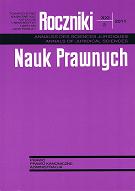Zastosowanie zasady kolegialności w kanonicznym procesie spornym i polskiej procedurze cywilnej
Collegiality Principle in a Canon Litigation and Polish Civil Procedure
Author(s): Magdalena KołbucSubject(s): Law, Constitution, Jurisprudence
Published by: Towarzystwo Naukowe KUL & Katolicki Uniwersytet Lubelski Jana Pawła II
Keywords: principle of collegiality; canon process; civil procedure
Summary/Abstract: The article discusses the special status enjoyed by the principle of collegiality, not only ecclesiastical procedural law but also in Polish civil procedure. Issues connected with the application of this principle in litigation are presented. The idea of collegiality is realized if the cognizance and adjudication in litigation are conducted by several judges, which guarantees objective process and fair judgment. In a canon litigation, collegiality is manifested by the competences of the collegial tribunal and its chief judge which are conditional and complement each other, whereas in Polish civil procedure collegiality manifests itself in the obligation to hear certain cases by an increased composition. In civil procedure, the principle of collegiality is one of cardinal legal principles. In litigation, a similar distinction is not found, but it is certain that these principles apply in canon law and enjoy special status in civil proceedings.
Journal: Roczniki Nauk Prawnych
- Issue Year: 21/2011
- Issue No: 2
- Page Range: 247-263
- Page Count: 17
- Language: Polish

